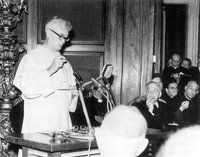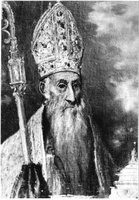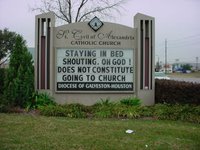Why I Don’t Call Myself An Evangelical (Part 2)
Ask yourself what comes to mind when someone uses the term fundamentalism. Nine times out of ten, I bet the word brings up several quite pejorative ideas, beliefs, types of “Christians,” possibly behaviors, etc. However, I will go a step further and declare that “evangelical” has a tendency to do the same thing. Let me illustrate, I was raised in an evangelical church (Southern Baptist), and educated at an evangelical seminary. In fact all my life I have spent my time with other evangelicals, or in evangelical churches of one kind or the other (i.e. from Baptist to Presbyterian). In this environment I was told that listening to certain styles of music was sinful, that drinking was sinful (of any kind), etc. While these are the more “cultural sins” on the list, the “theological sins” held the same tone and attitude; and all this was under the umbrella of “evangelical.” So, when I declared that I was an evangelical in the student room at Marquette University so many years ago, it does not surprise me that the others who were present responded the way they did. Moreover, in the arena of academia this merely highlights the difficulties and problems attached to the term, especially in light of current ecumenical changes.
So, if I choose not to “label” myself evangelical, what is the alternative? Avoiding the spill of “Oh, let’s just avoid labels” nonsense, is there a good alternative? I think so, and my answer would come from Thomas Oden. In his book The Rebirth of Orthodoxy
The “evangelical box” of my upbringing simply frustrates and confounds me. So I decided to jump out of that box 4 or 5 years ago. To move away from the more “pharisaical Christianity” that frowns up questioning certain teachings or “doing” certain things (i.e. listening to certain styles of music, etc. - I do not mean the more obvious lifestyle sins) is my intent. And of course, this is much broader than I have made it seem here in these two small posts (i.e. there is here certainly more to unpack than I was able). Therefore, for these reasons (and a few others) I do not call myself an evangelical.
Lastly, I want to delineate, as briefly as I possibly can, what I do not mean by these posts. I am not declaring that those who call themselves evangelicals are necessarily fundamentalists. Moreover, I am not declaring that those who are evangelical and fundamentalists are, ipso facto, not Christian. As I declared earlier, evangelicalism covers a lot of ground, especially around the world. There are many brothers and sisters in Christ who are in fact evangelical, and have no qualms about calling themselves evangelical. This is great! I applaud them in their work for Christ and in their claim of being evangelical. I simply see more problems in the unpacking of the term here in the U.S. and thus choose to avoid it. These two posts are merely a very simple explanation of my plight.
















